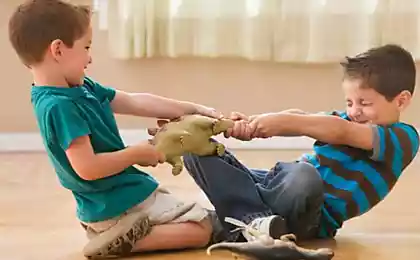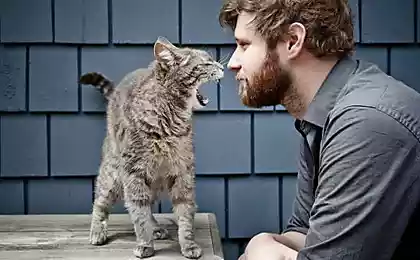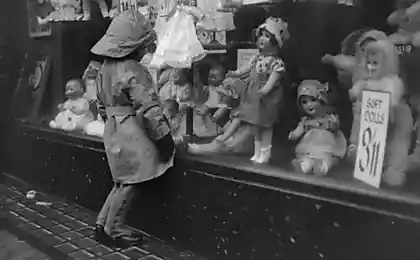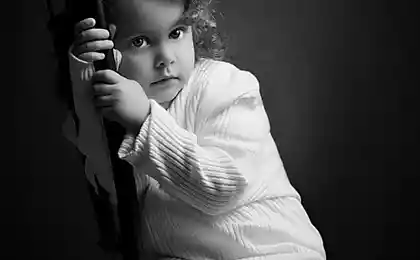486
I don't want to teach my son to fight back...
The younger son often comes back from music school wiped. One of his classmates bullies, fights (not painful, but very annoying) and takes away all sorts of stuff.
Talking to teacher: "Yes, this boy always and for all lifts. Kick him I can't. He actually lives with his grandmother, no father, no mother all week at work, and on weekends it sizelove. To her is not good. Grandma he blatantly disregards. Kick — we, of course, easier, but here at least he is in business and under supervision. On the other hand, the talent is there, the brain is, the character only... (profanity)".
Seventy one million nine hundred twenty one thousand nine hundred fifty three
Sitting, contemplating.
1. I don't want to teach my son to fight back. He is 9 years old lives with her two older brothers are not used to being that someone might hurt him. Let and further lives with this Outlook on life.
2. I don't want his older brothers bullied the smaller ones. That is, the average, of course, with the abuser to talk. But only talk on the use of force against the younger he simply taboo. A young bully is, alas, perfectly well aware.
3. I don't want to endanger herself nor her grandmother (she still did not be able to do), no to the bully. Because the only way to ensure the implementation of my requirements is to be present with my son in the classroom constantly, and it is in my plans not included.
4. I don't want to complain to the authorities, because it is the only possible reaction — the expulsion of the offender. And for that I'm not evil, and the teacher is clearly against.
5. I don't want to make it go away: the child must feel protected.
Anyway, I called the teacher and asked to make my son and this boy were no longer crossed. Neither the ensemble nor during normal lessons. In the end, I sympathize, but to help them in dealing with this problem are unable. My job is to defend against the attacks of their child. And he's not used to his hurt. The teacher replied that just gets me and schedule will review.
About this story and thought I wrote a post in his LiveJournal. ... And got, extremely, rough reaction of readers.
Almost every first commentator branded me a disgrace because I think it's normal that a child who's been hurt-stabbed in the children's team, not fought back, and appealed for protection to adults.Arguments:
1) it is unsafe — people should be able to physically stand up for themselves;
2) to talk about their grievances an adult is to violate the unwritten laws of a group of children, resulting in the fact that the Snitch would make an outcast;
The confirmation of such categorical statements is also quite friendly:
1) we have in childhood life is put before the need to fight back;
2) it is written in good books: Krapivina, Gaidar (then you can transfer almost all good Soviet children's and adolescent literature).
Seventy five million eight hundred forty five thousand seven hundred forty five
To agree is easy, but what follows from this?
Look. The need to give change, to know how to defend yourself physically is a sign that the team in which the child lives is, in fact, flock, in which the fundamental right — the right of the strongest. Different from our life, the life of adult citizens, isn't it?
And initially this is true, children in nature — being very Malozemelskaya, it is enough to observe the sandbox. There is very clear that these will leave yearlings alone, always find someone who will take the neighbor's shovel, and when you try master of the blade angry, knocks him on the head. Someone would just die, someone will rush to fight back and fight yearlings may in fact go quite far. By the way, the rest will stay away, because the desire to protect another — is also a skill that have to educate.
But what happens in reality: the fighters run up to my mother and (normal) the offender explain that to take away the blade is impossible, and offended return his property, regret and return to him a sense of security. So, the world supported adults and children receive the first lessons of justice.
And what about Soviet literature? I Love Krapivina! His early books are just saturated with concepts of truth and justice. We'll see if Les look closely at these very charming stories about children and adolescents? What is the difference between a flock of yearlings from a pack of students, if we agree that students is the same pack with a strong right? In fact, the absence of adults near the sandbox. Oh, and parting words from these missing adults: "If you get hit and take away the shoulder — hit in response and bring his spade himself. Neither I nor any other adult or the police will not protect you".
First and foremost. The absence of parents. Them or physically there (especially fathers), or they are engaged in: establishing personal life, building communism, working from dawn to dusk and all that jazz. In any case, faced with problems, the child never goes to parents. The teachers, too.
Second. External aggression with which the child is left one-on-one. Or aggressive teenagers ("Outpost on the anchor field") or less aggressive adults (same "Boy with a sword").
And here variants are possible. Most often, there is an adult stranger, who at first defends himself and then teaches them to protect each other. In fact, this creates adult for abandoned children a new home and inside this home begins to teach them life is not in the pack, but in human society. In the fantastic stories a child acquires superpowers and resists aggression by them on the road together with the same superdrine. And there in the end, the commander appears – invisible tutelary talented kids adult.
Thus, the scenario Krapivina: children without parents — they protect and nurture outsider adult. The question: you are your child such tales want?
Now consider the scenario more, by the way, realistic: when the magician is an adult and has not appeared. The Film "Scarecrow". In fact, what is it? About normal bunch of teenagers left without the attention of senior. There was a girl-a stranger who does not abide by their rules — they made fun of. It is quite natural: instinct, protection from outsiders. By the way, do something children is in the end perfectly realized. Remember? "We are the kids from the cage, we are at the zoo to show it!"But the adults as he was blind and deaf, and left. One of the adults who figured out what happened, the hairdresser — also gave advice in the framework of in-your-school-understand-you: "Promise me you won't forgive!"There were teachers, head teacher, parents, grandfather and no not only intervened, but did not even bother to understand what is happening. Yeah, Lena won, but I can only imagine what it is worth it! And why did she have to go through that? Why she was left alone, without any protection? And you gentlemen are supporters of the right forces want to raise a child's resistance so, in this scenario? You teach children that "You should never run"???
In principle, these two scenarios fits so beloved by many Soviet view raising a child: raising him or strangers (pioneer and others like them) or street. Parents feed, clothe and go to build communism or die for their country. Place them in a child's life is not.
Now, remember the fundamental law of education, without an understanding of which children is better not to communicate. The child listens to the words, it copies things. You did not protect your child. You think you taught him to defend himself? First of all, you taught him to throw the weak in the lurch. And instead of security (basic, among other things, the needs of any living creature) to utter all sorts of nonsense like "don't be a wimp!"and, "if you are being attacked, then you are to blame..." then left to defend themselves, maybe learn, but not others. For the weak and protects only those who in childhood felt a strong protect himself.
Also interesting: STRONG WILLED Children: what you need to know
To teach a child to "fight back»
In General, my script like this: the older protect the younger, these younger grow up with a sense of security and protect the following Jr.. And, by the way, do not throw them away in your adulthood, but remain close.published
Author: rose Volokhova, an intensive care doctor, mother of four children
P. S. And remember, just changing your mind — together we change the world! ©
Source: www.nashideti.site/?p=4132
Talking to teacher: "Yes, this boy always and for all lifts. Kick him I can't. He actually lives with his grandmother, no father, no mother all week at work, and on weekends it sizelove. To her is not good. Grandma he blatantly disregards. Kick — we, of course, easier, but here at least he is in business and under supervision. On the other hand, the talent is there, the brain is, the character only... (profanity)".
Seventy one million nine hundred twenty one thousand nine hundred fifty three
Sitting, contemplating.
1. I don't want to teach my son to fight back. He is 9 years old lives with her two older brothers are not used to being that someone might hurt him. Let and further lives with this Outlook on life.
2. I don't want his older brothers bullied the smaller ones. That is, the average, of course, with the abuser to talk. But only talk on the use of force against the younger he simply taboo. A young bully is, alas, perfectly well aware.
3. I don't want to endanger herself nor her grandmother (she still did not be able to do), no to the bully. Because the only way to ensure the implementation of my requirements is to be present with my son in the classroom constantly, and it is in my plans not included.
4. I don't want to complain to the authorities, because it is the only possible reaction — the expulsion of the offender. And for that I'm not evil, and the teacher is clearly against.
5. I don't want to make it go away: the child must feel protected.
Anyway, I called the teacher and asked to make my son and this boy were no longer crossed. Neither the ensemble nor during normal lessons. In the end, I sympathize, but to help them in dealing with this problem are unable. My job is to defend against the attacks of their child. And he's not used to his hurt. The teacher replied that just gets me and schedule will review.
About this story and thought I wrote a post in his LiveJournal. ... And got, extremely, rough reaction of readers.
Almost every first commentator branded me a disgrace because I think it's normal that a child who's been hurt-stabbed in the children's team, not fought back, and appealed for protection to adults.Arguments:
1) it is unsafe — people should be able to physically stand up for themselves;
2) to talk about their grievances an adult is to violate the unwritten laws of a group of children, resulting in the fact that the Snitch would make an outcast;
The confirmation of such categorical statements is also quite friendly:
1) we have in childhood life is put before the need to fight back;
2) it is written in good books: Krapivina, Gaidar (then you can transfer almost all good Soviet children's and adolescent literature).
Seventy five million eight hundred forty five thousand seven hundred forty five
To agree is easy, but what follows from this?
Look. The need to give change, to know how to defend yourself physically is a sign that the team in which the child lives is, in fact, flock, in which the fundamental right — the right of the strongest. Different from our life, the life of adult citizens, isn't it?
And initially this is true, children in nature — being very Malozemelskaya, it is enough to observe the sandbox. There is very clear that these will leave yearlings alone, always find someone who will take the neighbor's shovel, and when you try master of the blade angry, knocks him on the head. Someone would just die, someone will rush to fight back and fight yearlings may in fact go quite far. By the way, the rest will stay away, because the desire to protect another — is also a skill that have to educate.
But what happens in reality: the fighters run up to my mother and (normal) the offender explain that to take away the blade is impossible, and offended return his property, regret and return to him a sense of security. So, the world supported adults and children receive the first lessons of justice.
And what about Soviet literature? I Love Krapivina! His early books are just saturated with concepts of truth and justice. We'll see if Les look closely at these very charming stories about children and adolescents? What is the difference between a flock of yearlings from a pack of students, if we agree that students is the same pack with a strong right? In fact, the absence of adults near the sandbox. Oh, and parting words from these missing adults: "If you get hit and take away the shoulder — hit in response and bring his spade himself. Neither I nor any other adult or the police will not protect you".
First and foremost. The absence of parents. Them or physically there (especially fathers), or they are engaged in: establishing personal life, building communism, working from dawn to dusk and all that jazz. In any case, faced with problems, the child never goes to parents. The teachers, too.
Second. External aggression with which the child is left one-on-one. Or aggressive teenagers ("Outpost on the anchor field") or less aggressive adults (same "Boy with a sword").
And here variants are possible. Most often, there is an adult stranger, who at first defends himself and then teaches them to protect each other. In fact, this creates adult for abandoned children a new home and inside this home begins to teach them life is not in the pack, but in human society. In the fantastic stories a child acquires superpowers and resists aggression by them on the road together with the same superdrine. And there in the end, the commander appears – invisible tutelary talented kids adult.
Thus, the scenario Krapivina: children without parents — they protect and nurture outsider adult. The question: you are your child such tales want?
Now consider the scenario more, by the way, realistic: when the magician is an adult and has not appeared. The Film "Scarecrow". In fact, what is it? About normal bunch of teenagers left without the attention of senior. There was a girl-a stranger who does not abide by their rules — they made fun of. It is quite natural: instinct, protection from outsiders. By the way, do something children is in the end perfectly realized. Remember? "We are the kids from the cage, we are at the zoo to show it!"But the adults as he was blind and deaf, and left. One of the adults who figured out what happened, the hairdresser — also gave advice in the framework of in-your-school-understand-you: "Promise me you won't forgive!"There were teachers, head teacher, parents, grandfather and no not only intervened, but did not even bother to understand what is happening. Yeah, Lena won, but I can only imagine what it is worth it! And why did she have to go through that? Why she was left alone, without any protection? And you gentlemen are supporters of the right forces want to raise a child's resistance so, in this scenario? You teach children that "You should never run"???
In principle, these two scenarios fits so beloved by many Soviet view raising a child: raising him or strangers (pioneer and others like them) or street. Parents feed, clothe and go to build communism or die for their country. Place them in a child's life is not.
Now, remember the fundamental law of education, without an understanding of which children is better not to communicate. The child listens to the words, it copies things. You did not protect your child. You think you taught him to defend himself? First of all, you taught him to throw the weak in the lurch. And instead of security (basic, among other things, the needs of any living creature) to utter all sorts of nonsense like "don't be a wimp!"and, "if you are being attacked, then you are to blame..." then left to defend themselves, maybe learn, but not others. For the weak and protects only those who in childhood felt a strong protect himself.
Also interesting: STRONG WILLED Children: what you need to know
To teach a child to "fight back»
In General, my script like this: the older protect the younger, these younger grow up with a sense of security and protect the following Jr.. And, by the way, do not throw them away in your adulthood, but remain close.published
Author: rose Volokhova, an intensive care doctor, mother of four children
P. S. And remember, just changing your mind — together we change the world! ©
Source: www.nashideti.site/?p=4132























